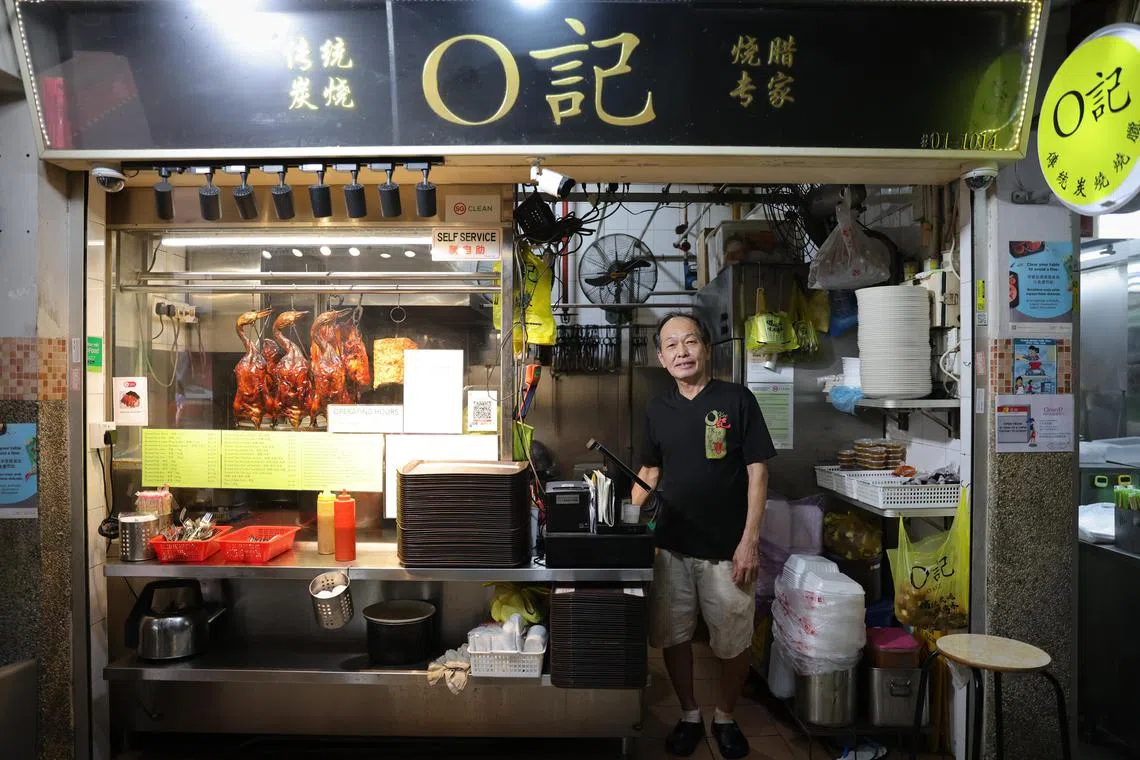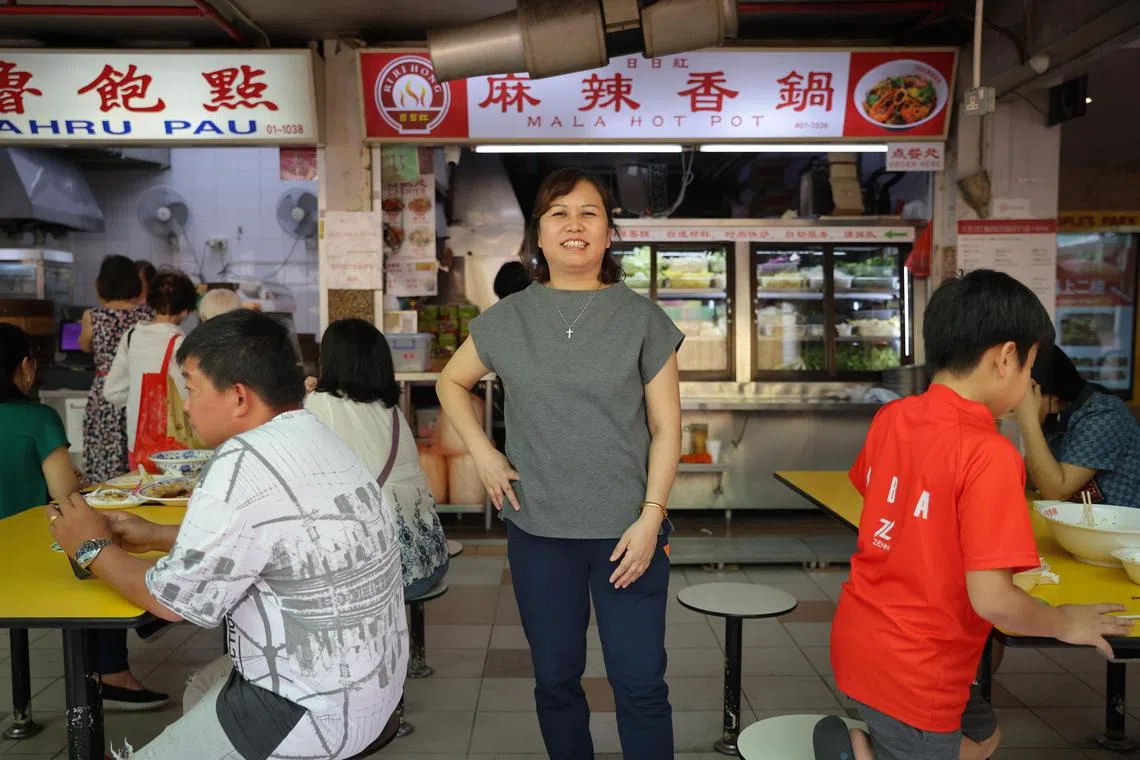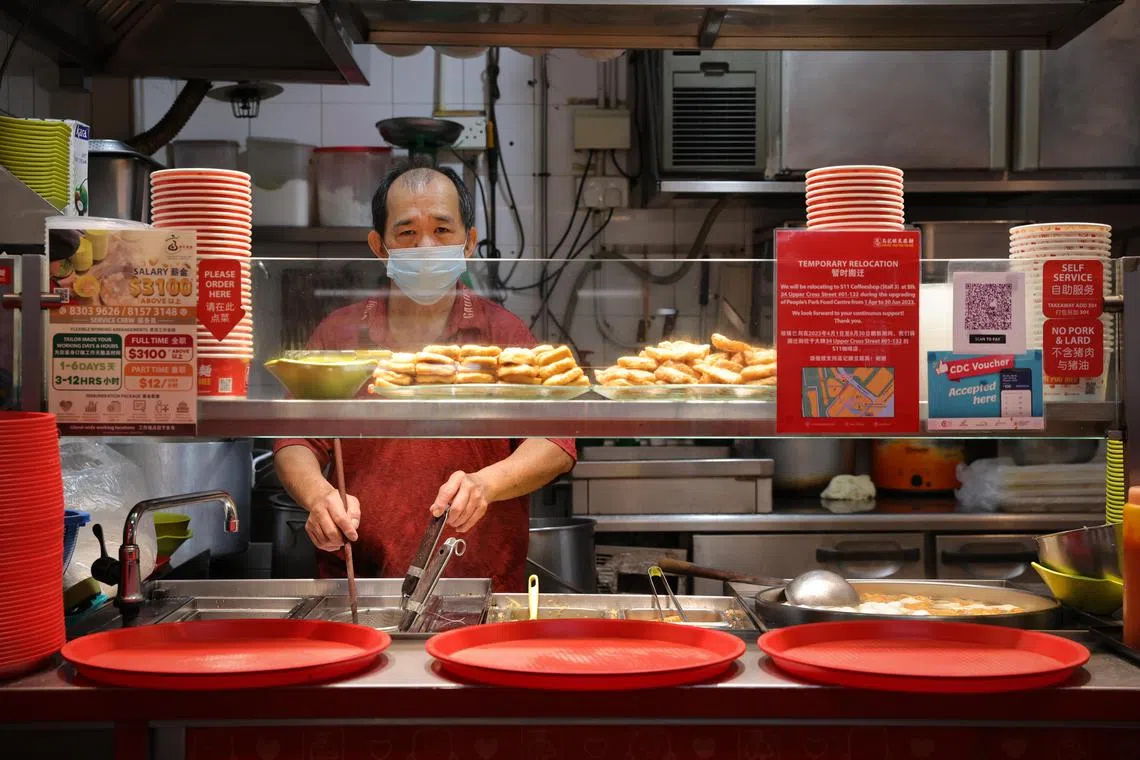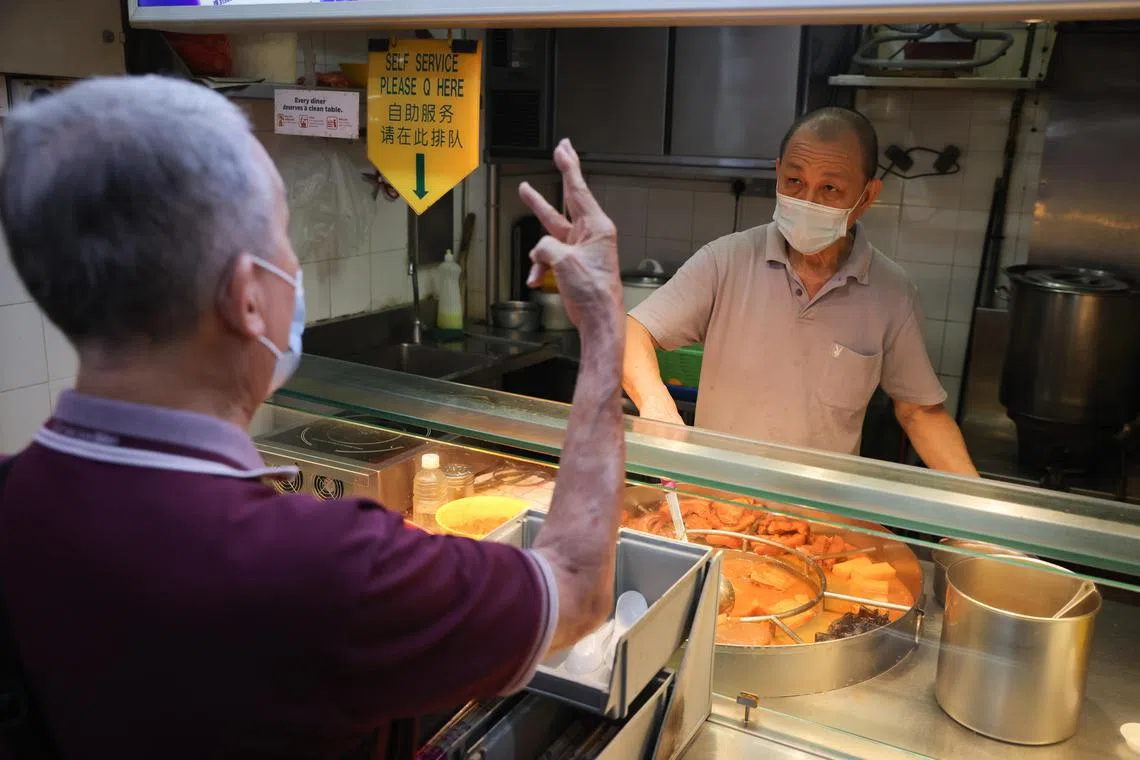Cleaner and brighter: People’s Park Food Centre welcomes upgrading to shed ‘dirty’ image
Sign up now: Get ST's newsletters delivered to your inbox
SINGAPORE – Roast meat chef Wong Fook Choy is looking forward to his “revenge travel” in the next three months. His ambitious itinerary includes Japan, Taiwan, Thailand and a cruise.
Other than Chinese New Year and Mondays, he has been slogging away in front of his chopping board for years, said the 62-year-old from O Kee Roast Delight at People’s Park Food Centre.
He was head chef of the famous Toh Kee Roast Duck, Singapore’s oldest roast meat stall, for 46 years at the same venue.
“Look at the broken floor tiles, tables and stools,” he said, of the state of maintenance of the food centre. “We could have upgraded earlier, but I heard plans were shelved due to the (Covid-19) pandemic.”
The popular food centre at Block 32 New Market Road will be closed for three months from April 1 to June 30 for repairs and redecoration.
Like Mr Wong, most hawkers and patrons say the upgrading is long overdue. The bustling food centre near Chinatown MRT station shows glaring signs of age.
Mr Yu Jun Jie, 53, a stall helper at Chuan Wei Fang, known for its Chongqing grilled fish and spicy crab, said that when it pours, the clogged drains cause flooding.
Regular patrons said the grimy floors and dim interiors need sprucing up. In recent years, the food centre has also earned a “dirty” reputation after sightings of rats and cockroaches.
Tour manager Elaine Chang, 58, said she visits the food centre only in the day, after the cockroaches and rats dine at night.
Ms Lynn Teo, a 49-year-old travel agent, found pigeons a nuisance. “They help themselves to the food the minute you get up,” she said. “You can see their droppings all over the place.”

Mr Wong Fook Choy, 62, roast master at O Kee Roast Delight, will embark on “revenge travel” when the People’s Park Food Centre is closed for refurbishment.
ST PHOTO: ONG WEE JIN
When contacted, the National Environment Agency (NEA) told The Straits Times that periodic refreshing of hawker centres through repairs and redecoration (R&R) work is carried out every six to eight years.
For affected hawkers at People’s Park Food Centre, NEA will grant rental remission for the duration of the work. Stall rents will also not be raised due to R&R.
NEA offers temporary premises to stallholders if they wish to continue their business at other hawker centres during this period, subject to stall availability. To date, no stallholder at the food centre has asked for a temporary stall.
The Jalan Besar Town Council told ST the major works include replacement of the tables and stools, retiling of the floors and walls, removal of the false ceilings and down lights, replacement of lights, repainting, and upgrading of toilets. The last R&R for the food centre was carried out in 2016.
From food shelter to hawker haven
People’s Park Food Centre originated as a “food shelter” in 1923 for Chinatown’s street hawkers. A fire in 1966 brought forward the Government’s plan to rebuild what was then known as People’s Park Market as part of urban renewal.
By mid-1969, the first phase of Singapore’s then biggest shopping-cum-residential complex was completed. The three-storey complex housed food stalls on the first level, and retail and textile shops on the second and third levels. By then, it was already touted as a favourite haunt of both locals and tourists.
The hawkers, who used to provide their own tables and chairs for their patrons in the old market, continued this practice at the new food centre. This resulted in territorial squabbles, touting activities and disgruntled customers. The “no free seating” issue was resolved only in 1992 when the Government installed fixed tables and chairs.
Today, the complex is home to more than 80 food stalls and 160 shops. Many flock to the food centre for its rich variety of delicious grub that gives more bang for one’s buck.
In the early days, most of the food sold was local hawker fare like roast meat and yong tau foo. About a decade ago, mainland Chinese food started appearing, and they are now sold at about half of the stalls.
“Business has improved after the influx of Chinese stalls,” said Madam Chia Sai Im, 78, chairman of the People’s Park Traders Association. “It is the diners, not the stallholders, who are ‘fighting’ over seats now.”
Pressure to raise prices
Ri Ri Hong Mala Hot Pot is among the first of many spicy hotpot stalls to open at the food centre, and is known for its mouth-numbing dishes, generous portions and cheap prices. There are two outlets at the food centre to cope with the incessant demand. The owners also operate Rockstar Chicken at the same venue.
Its workers, numbering about 20, can look for temporary jobs, and will be paid a token amount to help them tide over the period, said co-founder Mao Cong Fang from Henan, China.
Mr Mao, 51, said he will probably spend more time on his other outlet in Hougang.
Even if there is no rental hike after the refurbishment, he is feeling the heat from the inflationary pressures of food ingredients, and may not be able to resist price adjustments for long, he said.
While long-time workers will return after the closure, some newer ones are looking for other jobs, said the stall’s 50-year-old other co-founder, Madam Zhou Hai Rong.

Madam Zhou Hai Rong, 50, said some newer workers may move on during the temporary closure.
ST PHOTO: ONG WEE JIN
Some are taking the opportunity to go home.
Mr Yu of Chuan Wei Fang will return to his home town in Hubei for an extended visit after eight years.
“It is a must, especially since borders have also reopened after the pandemic,” he said.
Mr Sultan Mohideen, 65, who runs Al Ajmir Indian Muslim Food, had barely moved into the food centre two months ago, only to have to take an enforced three-month break soon. He will visit relatives in India.
Work will continue for others, but elsewhere.

Mr Ong Kok Loon, 64, works at Koo Kee Yong Tow Foo Mee, which will relocate to a nearby coffee shop during the renovations.
ST PHOTO: ONG WEE JIN
Staff at Koo Kee Yong Tow Foo Mee, a popular yong tau foo stall since the 1960s, said the business will be relocated to the S11 coffee shop at Block 34 Upper Cross Street during the upgrading.
The owners of Gao Ji Food also operate Dong Dong Hainanese Chicken Rice at the food centre. Stall helper Jackson Tan, 50, said he and his colleagues will be deployed to other outlets after a short trip to Taiwan.
At least one stallholder may call it a day.

Mr Chong Chiow Yen (right), 70, who owns Loh Mei Specialist, may call it a day.
ST PHOTO: ONG WEE JIN
Loh Mei Specialist’s founder, Mr Chong Chiow Yen, may hang up his apron. It is likely the only stall in Singapore serving a traditional Cantonese dish of braised meats and vegetables stewed in fermented beancurd gravy.
“My family has asked me to retire,” said the 70-year-old. “I am still thinking about it as I worry about turning senile.”
Prices of food ingredients have also spiked in recent times, eating into his profit margins. Should he continue after the upgrading, he will likely raise prices by 50 cents, he said.
Change is also imminent for the retail tenants on the upper levels of the complex even if they are not involved in the refurbishment.
Mr Henry Wong, who owns Thye Guan Textile on level two, said it is inevitable that his business will suffer.
“Some customers will think that the whole complex is closed for upgrading when they see the hoarding and construction,” the 66-year-old said. “Our traffic will also drop without the food patrons.”
He hopes his rental fees can be waived or cut for the next three months.
Madam Chia, who is director of Swanston, which sells toiletries on level two, said the association has reached out to the Housing Board (HDB) to request that the retail floors be upgraded at the same time. HDB is in touch with the association.
“Business will be adversely affected, so we might as well refresh ourselves too,” she said.
Habits must be ‘upgraded’ too
The upgrading will just be cosmetic if the cleanliness of the place is not maintained, said Mr Chong of Loh Mei Specialist.
“Many tables are not cleared and cleaned promptly, leading to all kinds of pests,” he said, adding that he once had to install a rat trap for days to catch a rodent.
Ms Chang, the tour manager, heard that some hawkers discard used oil into the drains. There are also litterbugs who dispose of used tissue or other rubbish on the floor, she said.
Habits must change even as hardware is renewed, said retired engineer Victor Yue, a regular patron who lives nearby.
“As in most food centres, there is a need to change the mode of operation in clearing the leftover dishes and wiping the tables,” said the 70-year-old. “There are still people who slip away after eating without clearing their crockery.”
Correction note: An earlier version of the story said that Toh Kee’s business was sold to O Kee. Toh Kee has clarified that it did not sell its business to O Kee Roast Delight, and is not affiliated or associated with other companies.


